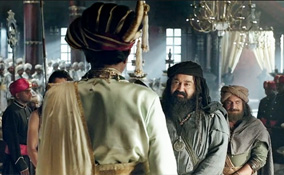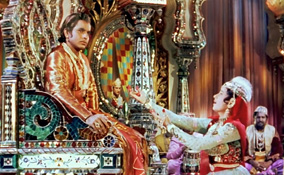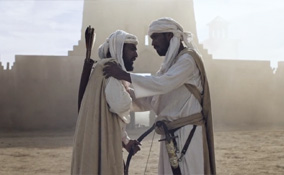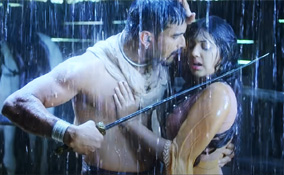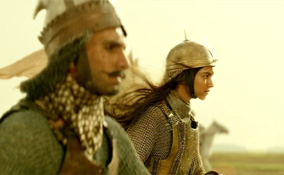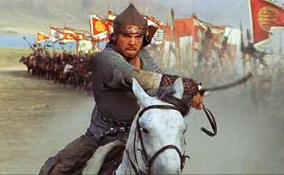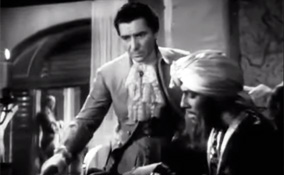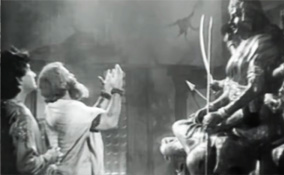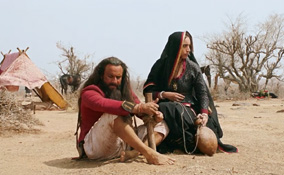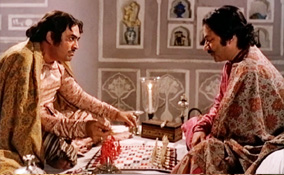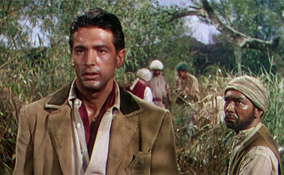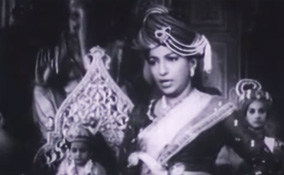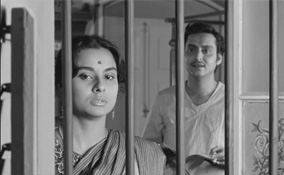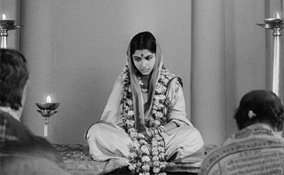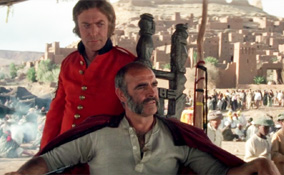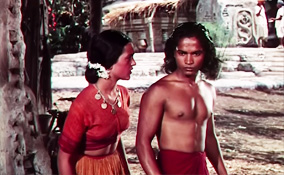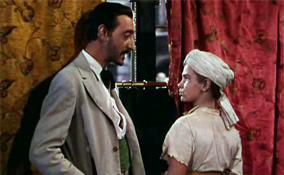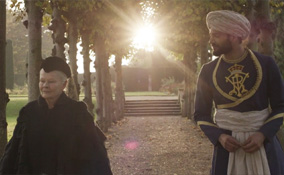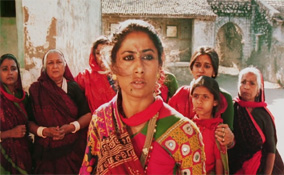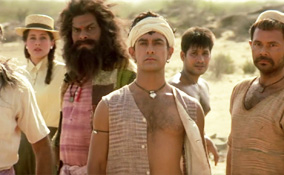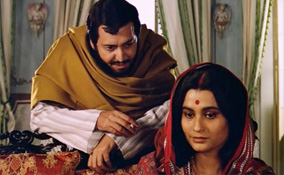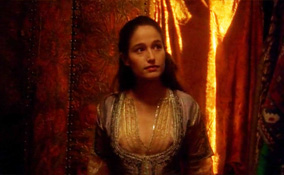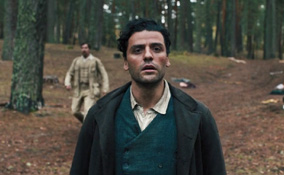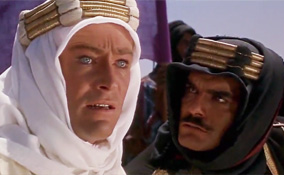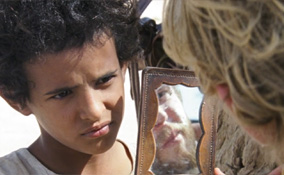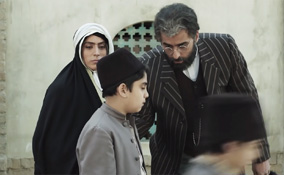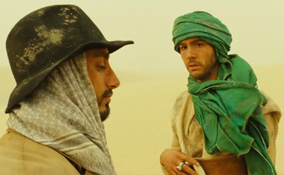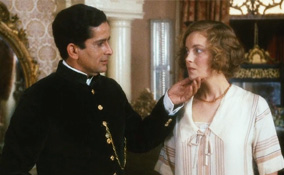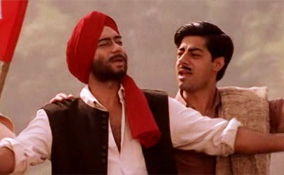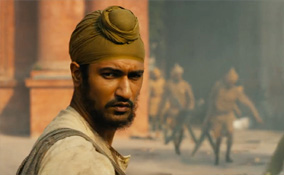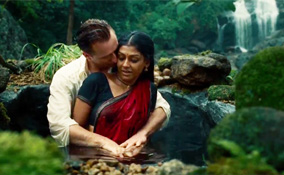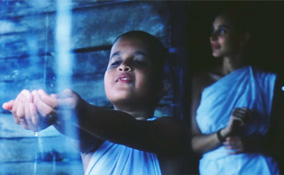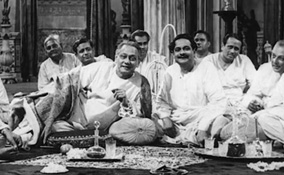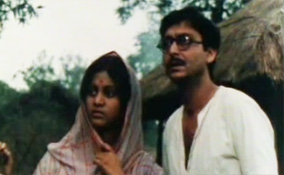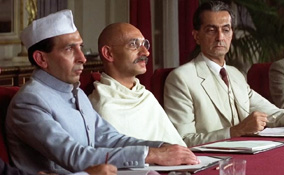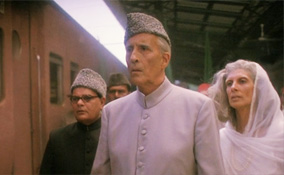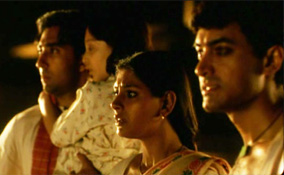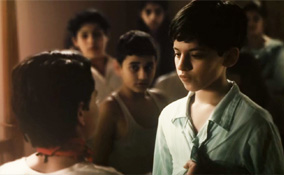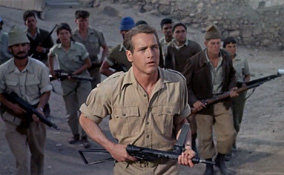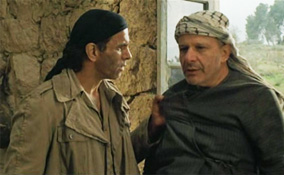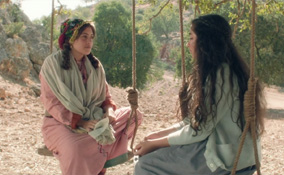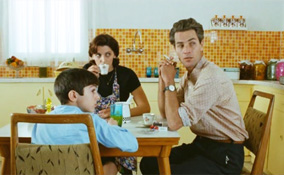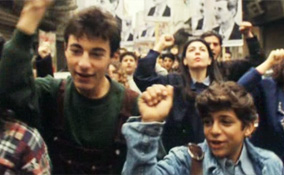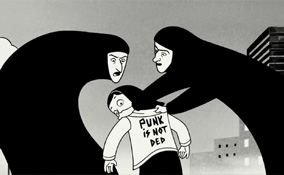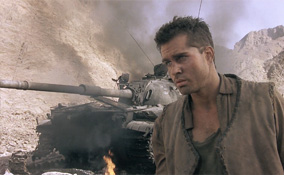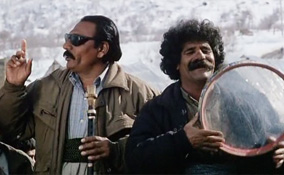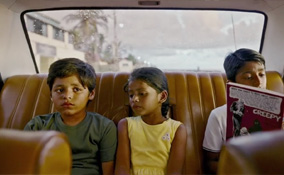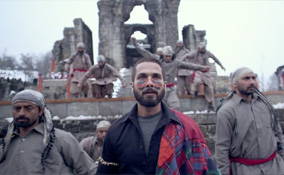<<< II
Notes on films about colonialism in Asia (1): Arabia to India
After the discovery of the Cape of Good Hope in 1497, Vasco da Gama landed in Calicut (now Kozhikode), Southern India in 1498, and was warmly welcomed by the Zamorin of Calicut. At that time Calicut was an important trading port connecting Arabia and China, the Portuguese then opened direct maritime route from Europe to India for the first time. When they had disputes with Arab merchants, the Portuguese allied with Raja of Kochi, defeating joint fleet of the Zamorin of Calicut, the Sultan of Gujarat and the Sultanate of Egypt in 1509 - marked the beginning of Portuguese dominance of the spice trade and the Indian Ocean.
Marakkar: Lion of the Arabian Sea (2021, Priyadarshan, India in Malayalam Language)* tells story of Kunjali Marakkar IV, legendary warrior of the Zamorin of Calicut. After his clan was destroyed by the Portuguese, he became a pirate and later joined the Zamorin to avenge the Portuguese. But Marakkar is too long with too many silly moments, this expensive South Indian film tries too hard to look like Hollywood products with not much substance or authenticity. Could be much better. 16th century Northern India, bratty Prince Saleem, the heir of the Mughal Empire, was sent to battlefields as punishment from his father, Emperor Akbar. Fourteen years later he was allowed to return to the palace, encountering another kind of battlefield when he falls in love with a slave girl. Beautiful and ridiculous at the same time, Mughal-E-Azam (1960, K. Asif, India in Urdu Language)** synthetically celebrates richness of arts and cultures during the reign of Emperor Akbar who was known for his military conquests and his respect for other religions, especially India's majority Hindu population. Akbar who was Sunni Muslim also married several Hindu princesses and one Christian. This classic epic film is absolutely beautiful but goes on and on with series of nonsensical decisions of main characters blinded by love. However, in the end, Mughal-E-Azam is nostalgic love letter to once diversified India with tolerance to differences. [FYI, there are some analysis about importance of various languages using in this film to represent pluralistic culture which of course I don't understand a word.]
Planning to control the Persian Gulf, the Portuguese attacked Khorfakkan (present-day UAE) in 1507 and colonized Hormuz (present-day Iran) in 1515. Khorfakkan (2020, Ben Mole, United Arab Emirates)* fictionalizes how people in this small village facing the cruel Portuguese army for the first time in 1507 and then skips to 1534 when the Portuguese attacked there the second time. Written by Sheikh Sultan bin Muhammad Al-Qasimi, the story of this propaganda film isn't very convincing, most of the time the behavior of the Portuguese and the response of the townspeople don't make much sense. Khorfakkan is just a band-aid to temporarily relieve the wounds of nation's pride.
Kingdom of Kotte, Ceylon 1518, a spy recruited by the Portuguese falls in love with a daughter of Kotte's defence minister. The love story in Vijayaba Kollaya (2019, Sunil Ariyaratne, Sri Lanka in Sinhala Language)* [watch] happens during the invasions of the Portuguese, and ends with historical event in 1521 when the Kotte King Vijayabahu VI's three sons mutinied, killed their father and divided the kingdom among themselves. This incident was known as the "Vijayaba Kollaya" (Sack of Vijayabahu). Released in 3D, this Bollywood-style film has very interesting backstory, but the main story is so silly with very annoying main characters. It's like they chose difficult subject and made it as clichéd as possible to attract easygoing local audience. Lost opportunity.
After
the religious attitude of Aurangzeb estranged non-Muslims, It resulted in the uprising of the Marathas. The Maratha Empire was formally established as self-rule Hindu kingdom in 1674 in Central India, and expanded to conquer former territories of the Mughals. Central Asia, 1710. There is a prophecy about an Islamic Kazakh boy who will be born and become a warrior uniting all the Kazakhs against the Jungars from Mongolia. Nomad: The Warrior (2005,
Ivan Passer, Kazakhstan)* [watch] is kind of a folktale about the real Ablai Khan, but was told in realistic style making it irrational and inconsistent. The film ends up as an action film with very thin story.
Under Mughal rule, Bengal (present-day Eastern India + Bangladesh) was a center of the worldwide muslin and silk trades, and also the most important center of cotton production. The Nawabs (Muslim rulers) of Bengal permitted European trading companies to operate in Bengal, but also suspicious of the growing influence of these companies.
Bengal 1770, while the British-backed Nawab of Bengal was enjoying parties in his palace, people were suffering from the Great Bengal Famine and still have to pay taxes to the British East India Company. Anand Math (1952, Hemen Gupta, India in Hindi)* is early Bollywood film made after Independence of India in 1947, it covers the rebellion against the British by army of Hindu ascetics - when independence movement became a Hindu cult. It was later known as The Sannyasi rebellion or monk rebellion. As the role of Muslims in the revolt was completely ignored, I'm not sure if the timing of making this film coincides with the rise of Hindu fundamentalism after the independence. But I don't feel related to some ideologies in this film at all. Strange experience.
After the Battle of Buxar in 1764 and the decline of the Mughal Empire, Northern India became a battleground between the Marathas, the Afghans and the English. Twenty five years later, a bounty hunter tracks a fort keeper who stole from the Marathas. Laal Kaptaan (2019, Navdeep Singh, India in Hindi)** is a revenge story in Western genre making it interesting and refreshing to watch. The secrets of the story will eventually lead back to the Buxar incident. Better than most of recent big-budget Bollywood films I've seen but still a bit too long as most Bollywood films are.
The kingdom of Oudh made a treaty with British East India Company to secure its independence, by paying for all expense of the Company in conquering other kingdoms. In 1856 while the king is enjoying his privilege life in traditional art, poetry and dance, the British considers him unsuitable to rule in Western standard. So the company decides to take over the kingdom by its army of Indians. Directed by India's greatest filmmaker Satyajit Ray (สัตยาจิต ราย), The Chess Players (1977, India in Hindi)*** [watch] has another storyline about two elites who obsess with playing chess while ignoring the situation and leaving their wives alone. This part captures mentality of Indians in 19th century, and is obvious metaphor about Indian people who will eventually realize the consequences of ignorance as they need to hold on to each other through troubled times. Very well made film though a bit dry in historical part.
British India 1856, an English Captain disobeyed his superior to save his troops of sepoys while attacking Indian rebels. He was later condemned by the British. At the time of one hundred years after the East India Company ruled India in 1857, there was a rumour that British rule will end soon. Bengal Brigade (1954, Laslo Benedek)** addresses the starting point of the rumours about the grease on rifles' cartridges that led to the Sepoy Mutiny. The film suggested that these were plotted by a Rajah - who was presented here as oppressive ruler of natives. The ending of this film might sound ridiculous when the sepoy's troops finally realizes how the British treated them well, and decide to repay their debts by fighting the Rajah's army. This is not far from the truth since this war ended by British-loyal sepoy's armies finally suppressing the Indian rebels.
19th century British India, after the fall of Maratha Empire in 1818, the British East India Company had power to decide who would be the king of Jhansi, with an agreement that the Company's army must remain in the kingdom and the new king must pay for its expense. The classic Queen of Jhansi (1953, Sohrab Modi, India in Hindi)** [watch] is about the national hero from the 1857 Sepoy Mutiny. A fourteen years old daughter of poor Brahmin was arranged to marry the fifty-years-old king of Jhansi, because she was predicted to be the queen who liberate the country from the British. When the king died there was a dispute about the next line of the throne between the Company and the queen. Then the Sepoy Mutiny began and spread all over India, the queen joined the rebels and fought the British. She was called by British officer as "the most dangerous of all Indian leaders". The queen died in 1858 in a battlefield and became a legend since. The story, songs and dances in this decent film are like homage to those heroes died in the first independence war of India that failed.
Calcutta, British India 1879, the wife of a political newspaper publisher finally realizes that she is falling in love with her husband's cousin. Charulata (1964, Satyajit Ray, India in Bengali)*** elegantly portrays the evolution of her passion toward literature and the man, amid politics of the British, secrets and betrayals, in Ray's signature of intimate approach to rich characteristic of his main characters. Based on "The Broken Nest" by Rabindranath Tagore, the film explores differences between politics and literature, intellectuality and sentimentality, Western educated and Indian background, confined area of women and international worldview of men - and in the end, reconciliation of both ends in the broken nest of India. A wealthy man had a vision that his sweet daughter-in-law was an incarnation of Goddess Kali. The girl was forced to become a worship figure, while her British educated husband plans to run away with her to Calcutta. But the girl, who was manipulated at first, starts doubting if she is the real deity. As Satyajit Ray pitches ridiculous traditional belief against Western rationality, The Goddess (1960, India in Bengali)*** asks so many questions that couldn't be answered easily, in a society that women cannot express their thoughts freely. The girl's hesitation throughout the film made me feel very frustrating but that tells us about mentality of women there. Excellent film.
Two English adventurers in 1882 British India plan a journey to fictional Kafiristan through Afghanistan, where they will conquer it and become their kings. Adapting from Rudyard Kipling's short story which was inspired by story of James Brooke, the British soldier who became Rajah of Sarawak in 1841, John Huston's The Man Who Would Be King (1975)*** follows classic theme of White savior in which white men help organizing chaotic native army to fight with enemies, but this time with bad intentions. Entertaining adventure film that doesn't say much about natives who are also roughly fictionalized. British India 1867, a boy was discovered in a cave
among wolves.
He could not speak, walked on all fours and ate raw meat. He was named Dina Sanichar, meaning Saturday - the day he arrived at the orphanage. Sanichar died of tuberculosis in 1895.
The story of Rudyard Kipling's Kim (1950,
Victor Saville)** happens during the Great Game, a political and diplomatic confrontation between the British Empire and the Russian Empire over influence in Central Asia, primarily in Afghanistan, Persia, and later Tibet - or the first Cold War. Agra, British India 1887, two Muslim Indians were selected and sent to England to present a medal to Queen Victoria. She preferred one of them, Abdul Karim, and kept them as footmen while he started teaching her Urdu - Islamic language of the Mughals, the former ruler of India. Their relationship later shook the British establishment, they threatened to have her declared insane and removed from the throne. Victoria & Abdul (2017, Stephen Frears, UK)** portrays the first contact of the oppressor and the oppressed - the Empire that was impressed by humbleness and mystery of India, and the India that was gratified by kindness of the Empire. However, the theme of this film contrasts to reality when Queen Victoria's Bronze statue in Agra was vandalized in 2014, the same statue presented in this film's location that was also disrupted by Indian nationalist group during film shooting in 2016. This heavily romanticized story is highly questionable though quite satisfying as a fiction.
In colonial India, a ruthless tax-collector of the British government demanded a married woman to sleep with him. She fled into a spice factory and locked themselves inside. So the tax-collector threatens to destroy the village. The conflict expands when the men in the village agree to send her to the tax-collector, but the women won't. A Touch of Spice (1986, Ketan Mehta, India in Hindi)*** becomes very good resistance film with multiple layers involving many complicated issues. While majority of mainstream Indian films contain some musical scenes with dancing, A Touch of Spice uses gramophone (first introduced in 1887) to play Indian songs instead. This cold metal instrument is clever metaphor representing power of Western civilization that now took over India, where native people fought against each other.
1903, Lord Curzon, the Viceroy of British India, introduced the partition of Bengal into two states as Hindu Bengal and Muslim Bengal to control local protests against the British. This "Divide and Rule" strategy
creates a rift between two religious communities and strengthens British position by turning Hindus and Muslims against each other. In response the Swadeshi movement was formally started at Calcutta in 1905 to boycott foreign goods and relying on domestic production.
++++++++
Constantinople 1904, the Ottoman Empire. Safiye, an Italian girl who was bought from a slave market at Cairo and given to Sultan Abdul Hamit as a present, found a way to become Sultan's favourite girl in harem. Harem Suare (1999, Ferzan Özpetek, Turkey)*** examines the decline of the Ottoman Empire from inside of the last harem. In 1908 The Young Turk Revolution ended the absolute rule of Sultan and restored the Constitution. The Sultan was deposed to Greece, and his half-brother was proclaimed as Sultan Mehmed V. In the end, the closed harem would be finally broken open by the revolutionists from the outside world, and every life would leave in their own separate ways straying into the new uncertain era. Though a bit difficult to follow, this is interesting film from interesting director. Suffered from defeats in the 1912-1913 Balkan Wars, the Young Turk government feared that the Armenians would seek independence from the Ottoman Empire, leading to massacres of Armenians in 1914. When the Ottoman Empire entered the First World War allied with Germany, things get worse.
During WWI, the Ottoman Empire, on the same side with Germany, wanted to reclaim Egypt from the British Empire. Ottoman forces attacked British forces in Egypt in 1915 attempting at raiding the Suez Canal, which was of vital strategic importance to the British. Lawrence of Arabia (1962, David Lean, UK)**** portrays the life of T.E. Lawrence, an English officer who successfully united Arab tribes in order to fight the Turks in Sinai Peninsula, the only part of Egypt located in Asia. Arrogant, reckless, independent and narcissistic, liar and opportunist - is this very complex character of Lawrence the same as the British Empire? Filmmaking at its finest. Arabia, 1916. A Bedouin boy joined a desert journey to guide a British officer to his secret destination. The story of Theeb (2014, Naji Abu Nowar, Jordan)*** happens during WWI when British-supported Arab forces revolted against the Ottoman Empire. This is a coming-of-age film about a boy whose life swaying between the British colonialist and the Ottoman imperialist, as a metaphor for Arab countries trapped in WWI. Very well made film.
Persia (present-day Iran),
ruled by the Qajar dynasty since 1789, declared its neutrality during the outbreak of the First World War. But with its strategic location and the country's oil reserves, first discovered in 1908, made it unable to stay out of the conflict.
The invasion of Iran by the Ottoman Empire, British Empire and Russian Empire began in December 1914 until 1918.
Early 20th century Arabia. As a result of conflict between two tribes, two princes from one tribe were held as hostages in another tribe. Fifteen years later, the discovery of crude oil reserves by the Texas Oil Company in 1930s raises new conflict between them. Loosely based on history of Saudi Arabia, Jean-Jacques Annaud's Black Gold (2011)** encapsulates the moment when wealth literally rushed out of the futile desert for the first time, and different reactions from two kinds of people there: one practical, modern but greedy; another religious, humble and conservative. This Hollywood film is very promising in the first hour but unfortunately turns into typical heroic tale in the second hour. It ends with victory of moderate and modernized Middle East.
British India 1920s, an Indian doctor tried to show off to two English ladies by arranging a trip to Marabar caves. But some complicated incident at the caves upsetting their communities and shook the British Empire. While E.M Forster's book focuses on identity crisis of the Western-educated Indian, David Lean's A Passage to India (1984)*** changes from the Indian perspective in the book, to the British point of view. Dark and empty caves symbolize the mysterious India which two ladies expected to find but instead feel unbearable. This film is actually about self-exploration of self-centered English lady that terribly affects lives of natives - power of imperialism indeed. Though beautifully made, the book is obviously better and more interesting from the Indian perspective. Merchant-Ivory film Heat and Dust (1983)** tells story of the wife of a British colonial officer and a nawab (Muslim prince) in 1920s British India - through the investigation of her niece in 1980s India. Apart from the affair, the film also explores relationship between the British Empire and the semi-autonomous nawab state which would be finally forced to dissolve into the British Raj. Unfortunately, the part in 1980s is long, boring and unnecessary to the story.
Driven by 1919 Amritsar massacre and disappointment of Gandhi's non-violence, Bhagat Singh who was Punjabi Sikh became a radical freedom fighter. Borrowing ideas from Bolshevism and anarchism, he carried out the assassination of a police officer, and later the bombing in the Indian Parliament Building. His dream of secular India contrasted to Gandhi and his popularity rivaled that of Gandhi himself. He was arrested and hanged at age 23. The Legend of Bhagat Singh (2002, Rajkumar Santoshi, India in Hindi)** makes a good point for comparing differences of Singh and Gandhi, however the film reduces history lesson into shallow pop culture that easy to digest but not healthy. After the arrest of Bhagat Singh in Lahore, Indian Revolutionary Udham Singh fled to England. In 1940 with helps from USSR and IRA, he assassinated Sir Michael O Dwyer, who was responsible for the 1919 Amritsar Massacre, in London. Sardar Udham (2021, Shoojit Sircar, India in Punjabi)** follows his journey to England and explores his time in London where he planned the assassination. This is a very-well-made film, especially the scene of the massacre. But it tries too hard to make good arguments about the massacre, the assassination and the independence that feels like going on and on forever, until losing its sharpness in the end. Should be much shorter.
Kerala 1937, British India, an English tea baron in Southern India had an affair with married Indian servant. When it was exposed he pulled everyone down into the mud. Before the Rains (2007, Santosh Sivan, India in Malayalam)** reminds me of Mister Johnson (1990) when it focuses on an Indian guy who stands between two cultures/societies and cannot choose if he wants to stay on the British side, or his people's fight for freedom. The rain represents changes, in this case the Independence of India in 1947. It will wash away everything good or bad. But India will always stay standing here through every storm. British India 1938, a seven-year-old girl was arranged to marry a mature man. The man died and she becomes a widow who was expected to remain chaste until the day she dies. Water (2005, Deepa Mehta, India in Hindi)*** follows lives of the girl living in a house of widows, and Kalyani - a beautiful widow who was forced into prostitution. One day they meet a handsome university student who worships Gandhi. In this film, water represents the joy of life (and a touch of modernity) that will falls once in a while, then it will be gone leaving behind dry and unfulfilled lives that even the whole sacred river couldn't quench the thirst. Mehta's wonderful third film in her trilogy concludes that when love is a sin, and some cruel traditions cannot be changed - better let it die out, the future is in the modern world of free India.
In pre-independence India, Satyajit Ray's The Music Room (1958, India in Bengali)**** tells story of an Indian feudal lord who obsesses with traditional music, he lavishly spends his fortune for this passion to his last jewelry. After the unexpected tragedy, literally every scene in the second-half of the film poetically symbolizes the inevitable decline of the old world - in front of arrogance of the modern world. Slow with very little story, sometimes remind me of the films of Ingmar Bergman and Luchino Visconti, this is Ray at the height of his game. When Japan invaded British Malaya and then Burma, the Pacific war cut off cheap rice from Burma and raised the price of rice in India.
The Government of Bengal also
preferentially distributed rice to the army during the war. Combined with natural disasters and malaria, this situation caused the Great Bengal famine in
1943 that killed about 3 million people of Bengal (present-day India + Bangladesh).
++++++++
|
||
Facing racial segregation in 1880s South Africa, an Indian attorney Mohandas Gandhi challenged South African authorities and became famous in British India. When he returned to his homeland in 1915, Gandhi first appeared in Indian traditional dress that turned him into national hero. Gandhi (1982, Richard Attenborough)*** portrays the monumental life of the unique man who was heavily influential to the Independence of India from the British Empire in 1947. He started non-violent non-cooperation campaign, led the salt march to challenge the British laws, and later declared a hunger strike to stop civil war. But his dream of one India for all religions would be shattered by Jinnah and the partition of India into Hindu-dominated India and Muslim-dominated Pakistan.
There were four main architects responsible for the independence and the partition of India: Mountbatten, Gandhi, Nehru and Jinnah. Considering the inferior position of Muslims in British India, the controversial Muslim politician Muhammad Ali Jinnah requested separation of a new Muslim country from British India, and named it Pakistan.
Lahore 1947, British India (present-day Pakistan), Earth (1998, Deepa Mehta, India in Hindi)*** tell story about tragedy of the partition of India through the eyes of a wealthy Parsi family and their Hindu nanny. From a group of friends, every character start changing and taking sides in the massacres, and taking advantages of the situation. Earth intensively focuses on the massacres between Hindus, Muslims and Sikhs on Pakistan side of border - when partition of the earth divides people forever.
On midnight of 14th August 1947, the Independence Day of India, 1001 children were born with supernatural powers. Among them two newborn children were switched at the hospital by a nurse between a rich Muslim family and a poor Hindu one. Adapted from Salman Rushdie's acclaimed book, Midnight's Children (2012, Deepa Mehta)*** spans from the partition of British India and 1958 Pakistani coup d'état, to 1965 India-Pakistan War and 1971 Pakistan Civil War that ended with India's invasion to liberate Bangladesh from Pakistan. It examines the partition of once diversified India subcontinent but now fragmented by religions and politics. The book might be better in many aspects but this film makes the point of the story clearer and more focused, though the script (written by Rushdie himself) is a bit inconsistent. The film also makes good decision to change the ridiculous superpower of Shiva character which I think very cartoonish in the book. Midnight's Children ends during 1975 Emergency of Indira Gandhi, daughter of Nehru, when she ordered to get rid of all midnight's children - once the promises of free India, by her father. Better than expected.
++++++++
During WWI, while the British Empire promised the independent unified Arab state to various Arab tribes, it also made a promise to Jewish people with the Balfour Declaration of 1917 for the founding of a Jewish state in their ancient homeland, then Mandatory Palestine. But after most Arab leaders expressed great consternation at the idea of a Jewish homeland, and Arab religious leader in Palestine began to preach violence against the Jews, the British limited Jewish immigration severely.
In 1947 after WWII and the Holocaust, the ship named Exodus 1947 illegally took 4,515 Jewish migrants who were Holocaust survivors, from France to Mandatory Palestine. The British Royal Navy stopped the ship and the refugees were sent back to France. Amos Gitai's Kedma (2002, Israel)** opens in a Jewish immigrants' ship named Kedma (meaning "Towards the East"), heading to Palestine where they would face with hostile British troops when landed. This very pretentious film gets to the point when the newly arrived Jews who fled from the British, meet a caravan of Muslims running from the Jews who conquered their homeland. Then the Jewish terrorists fight the Muslims and finally establish their 'promised land'. Set seven days before the foundation of Israel in May 1948, the structure of Kedma is almost the same as Exodus but the enemy was changed to the Muslims. Good intentions, good concept but poor execution.
Palestine 1948, Farha was living in a small village in the countryside. When all the British immediately left Palestine, the Israeli soldiers invade the village. Her father locks her inside a pantry for her safety. From this point onward Farha (2021, Darin J. Sallam)*** tells story from perspective of the Palestinian girl in the darkness experiencing the war outside. Based on true story, the film shows extreme cruelness of Israelis to Palestinians recalling the Holocaust. It can be a companion piece to Exodus since these two films stand at the very ends on both sides of the spectrum of the same event. The scene when the girl tries to break the door in the end could be metaphor about how Palestinians become terrorists just to survive. Depressive coming-of-age film.
The Time That Remains (2009, Elia Suleiman, Occupied Palestinian Territory)*** is a black comedy following a Palestinian family from the founding of Israel in 1948 to the present day. This auto-biographical film of the director feels like intellectual version of Wes Anderson's film (or I should call Anderson as empty version of Suleiman). Audience needs some knowledge about the Middle East to understand some jokes. There will always be something lost on way we live through time, The Time That Remains captures the holes in the heart of the protagonist that increase with his age, and also of his peoples who will still go on living lives in this conquered land. Hilarious but very lonely film.
After the First World War, Lebanon was transferred from the Ottoman Empire to France
from 1920 to 1943,
and the country's parliamentary structure became favouring its Christian-majority population more than Muslims.
The influx of thousands of Palestinians after
1948 Arab-Israeli War changed landscape of Lebanon's politics led to several phases of civil war between Christians and Muslims in 1958, 1975 and 1980s,
which around 150,000 people were killed. Iran 1963, the US-backed shah, Mohammad Reza Pahlavi,
launched
The White Revolution which
is series of reforms resulting in aggressive modernization in Iran,
that upended the wealth and influence of landowners and Shi'a clerics, led to rapid Westernization, and prompted concerns over democracy and human rights.
Soviet troops invaded Afghanistan in 1979 to support
the Afghan communist government in its conflict with anti-communist Muslim guerrillas,
and remained in Afghanistan until 1989.
During that time, insurgencies arose against the government by the mujahideen (“those who engage in jihad”), they were trained and supplied via Pakistan by the United States. One of US-trained mujahideen was Osama bin Laden from Saudi Arabia. After the fall of the Ottoman Empire, Kurdistan was divided into parts of Turkey, Syria, Iran and Iraq. The Kurdish people become one of the largest ethnic groups in the world that do not have a state of their own.
The island of Ceylon (present-day Sri Lanka) was under British rule from 1815 to 1948, after
the last king of kandyan kingdom was deposed to southern India. The British established coffee,
tea and rubber plantations, and made Ceylon one of the richest countries in Asia.
They also brought Tamils (ทมิฬ), who were Hindus, from British India to be labourers in the Hill Country, while there were already several hundred thousand Tamils in this Buddhist-Sinhalese (สิงหล) majority island. Kashmir was a former princely state ruled by Hindu maharaja over population of Muslim majority. When India and Pakistan became independent, the maharaja chose to bring Kashmir into India, while its people wanted to be with Pakistan. This conflict led to riots, massacres and finally war between two countries. Some radical Islamist insurgent groups emerged after the end of the Soviet-Afghan War in the 1980s when a large number of Muslim jihadist militants began to enter Kashmir Valley through Pakistan. The conflict continues to this day with estimated 80,000 deaths. For Pakistan, Kashmir is its Palestine.
Some other films I watched recently: The River (1951, Jean Renoir)*** Kippur (2000, Amos Gitai. Israel)** Argo (2012, Ben Affleck)**
|
||
++++++++
Read Further:
P.S. I may be too harsh on Bollywood films. But in my opinion, watching Bollywood-style movies is like attending a festival where there are many kinds of performances showing on stage/screen trying to grab audience's attention with exaggerated ideologies. Sometimes they try too hard to please every groups of audience with various styles of entertainments that when compresses all of them into one film, it breaks apart. On the other hand, they might be considered as other kind of entertainment that is different from traditional cinema we knew. P.S.2 "The Middle East" is colonial term coined by the British in 1902, as India is "the Far East" and the Ottoman Empire is "the Near East" from London. P.S.3 "Jinnah was outraged that his nation's larger neighbour would be called India.
He believed that Pakistan was a part of India, the great landmass recognised as a coherent civilisation for centuries. Jinnah saw India as a construct that was altogether greater than the two new nation-states.
Posted: August 2023
<<< II
|
||
 |
||

